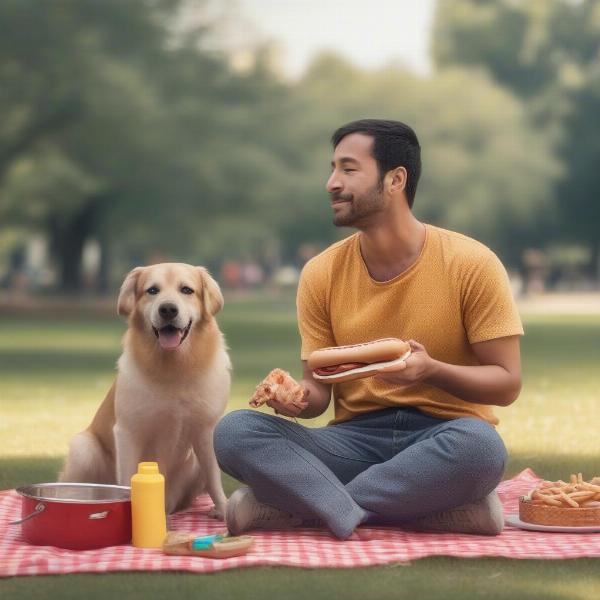Cheddar dogs, a playful moniker rather than a specific breed, often refers to the delightful combination of hot dogs and melted cheddar cheese. While we focus on canine companions here at ILM Dog, the term “cheddar dogs” doesn’t directly relate to dog breeds or care. However, understanding what our human companions enjoy can sometimes help us better understand their interactions with our furry friends. Let’s explore this cheesy culinary creation and its possible connections to our canine pals.
The Allure of the Cheddar Dog
What is it about a cheddar dog that makes it so appealing? The salty snap of the hot dog, combined with the gooey, rich flavor of melted cheddar cheese, creates a simple yet satisfying culinary experience. Often enjoyed at sporting events, barbecues, and casual gatherings, the cheddar dog represents a classic comfort food. But how does this relate to our four-legged friends? While we shouldn’t share our cheddar dogs with our pups due to the high sodium and fat content, understanding our own food preferences can give us insights into the importance of a balanced and nutritious diet for our dogs. Just as we appreciate a tasty treat, our dogs thrive on a diet specifically formulated for their needs.
Canine Cuisine: Nourishing Your Furry Friend
While we indulge in cheddar dogs, our canine companions require a different approach to nutrition. A balanced diet for a dog includes high-quality protein, healthy fats, carbohydrates, and essential vitamins and minerals. Choosing the right food for your dog depends on factors like age, breed, activity level, and any underlying health conditions.
Choosing the Right Food for Your Dog
Selecting the right food can be daunting with so many options available. Look for foods that meet the Association of American Feed Control Officials (AAFCO) standards and consult your veterinarian for personalized recommendations. They can guide you towards the best choices for your dog’s specific needs, ensuring they receive optimal nutrition for a long and healthy life.
Cheddar Dogs and Canine Companions: A Safe Approach
While sharing a cheddar dog with your furry friend is not recommended, the term itself can spark a conversation about responsible dog ownership. Just as we are mindful of our own food choices, we must prioritize our dogs’ nutritional needs. Providing fresh water, a balanced diet, and regular exercise are crucial components of responsible pet care.
 Dog sitting with owner at a picnic
Dog sitting with owner at a picnic
Avoiding Table Scraps
It’s tempting to share our food with our dogs, especially when they give us those pleading puppy-dog eyes. However, many human foods, including cheddar dogs, can be harmful to dogs. Foods high in sodium, fat, and certain spices can lead to digestive upset, obesity, and other health issues. Stick to dog-specific treats and ensure your dog’s primary source of nutrition comes from a balanced and complete dog food.
Conclusion: Focusing on Canine Nutrition
While “cheddar dogs” might bring to mind a tasty treat for humans, it’s essential to remember our canine companions have different dietary needs. By focusing on providing a balanced diet, fresh water, and regular exercise, we can ensure our furry friends live long, healthy, and happy lives.
FAQ:
- Can I give my dog a small piece of a cheddar dog? It’s best to avoid giving your dog any part of a cheddar dog due to the high sodium and fat content.
- What should I do if my dog accidentally eats a cheddar dog? Monitor your dog for any signs of digestive upset, such as vomiting or diarrhea. If you notice any concerning symptoms, contact your veterinarian.
- What are some healthy treats I can give my dog? Look for dog-specific treats made with wholesome ingredients. Fruits and vegetables like carrots, apples (without the core and seeds), and blueberries can also be healthy treats in moderation.
- How can I ensure my dog is getting a balanced diet? Choose a high-quality dog food that meets AAFCO standards and consult your veterinarian for personalized recommendations.
- What are the signs of a nutritional deficiency in dogs? Signs can vary depending on the specific deficiency but may include dull coat, weight loss, lethargy, and digestive problems. Consult your veterinarian if you suspect your dog has a nutritional deficiency.
- How often should I feed my dog? This depends on your dog’s age, breed, and activity level. Consult your veterinarian or follow the feeding guidelines on your dog food packaging.
- Can I give my dog human food? Some human foods are safe for dogs in moderation, while others are toxic. Always research before giving your dog any human food and consult your veterinarian if you have any questions.
ILM Dog is a leading international online resource dedicated to providing dog owners with reliable and practical information on all aspects of dog care and well-being. From breed selection and puppy care to senior dog care and training tips, we’re here to help you navigate the joys and challenges of dog ownership. We cover everything from nutrition and grooming to health and behavior, ensuring you have the knowledge and resources to provide the best possible care for your beloved companion. For expert advice and personalized support, reach out to our team at [email protected] or call us at +44 20-3965-8624. ILM Dog is your trusted partner in providing a happy and healthy life for your furry friend.